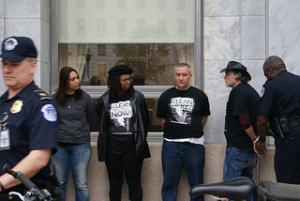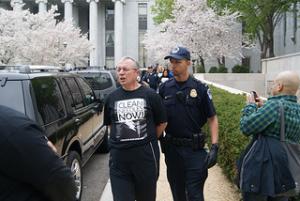Politics & Advocacy
After 20 years of walking in the political wilderness, public health and harm reduction advocates for federal funding for needle exchange programs made it to the Promised Land in December 2009, when the Democratic-controlled Congress overturned the longstanding funding ban. But just two years later, led by the Republican-controlled House and with the acquiescence of the Democratic-controlled Senate, Congress reinstated the ban in its 2012 federal omnibus spending bill.

Needle exchange advocates arrested on Capitol Hill Wednesday (Stephanie Simpson, Housing Works)
Although the funding ban's main proponents are Republicans, repealing the ban is actually the states' rights, deregulation position. Each year the federal government authorizes funding for grants to states to be used for AIDS prevention and treatment. When the ban was temporarily lifted, it neither increased nor decreased the amount of AIDS funding, but it meant that states could choose for themselves whether or not to use some of those funds to support needle exchange programs.
The activists have science and the evidence on their side. The Centers for Disease Control and Prevention (CDC), American Medical Association, National Academy of Sciences, American Public Health Association, and numerous other scientific bodies have found that syringe exchange programs are highly effective at preventing the spread of HIV/AIDS and other infectious diseases. Eight federal reports have found that increasing access to sterile syringes saves lives without increasing drug use.
More than 200 needle exchange programs operate across the country in cooperation with local law enforcement officials and health departments, but many are in danger of closing their doors or cutting back services without access to federal funds. That puts lives and the public health at risk.
Needle exchange supporters said the restored the ban will result in thousands of Americans contracting HIV/AIDS, hepatitis C or other infectious diseases next year alone. According to the Harm Reduction Coalition (HRC), needle sharing by injection drug users accounts for 8,000 new cases of HIV and 15,000 new cases of hepatitis C each year. In New York City, there has been a 75% reduction in new HIV cases as a result of instituting such programs, according to a 2005 study cited by HRC.
"We need Congress to stand behind public health and science, and declare a cease-fire on syringe exchange," said HRC executive director Allan Clear. "All of the research tells the same story: Syringe exchange prevents infections, promotes drug treatment, and reduces drug use. Congress must stop treating syringe exchange as an ideological pawn in partisan politics."
"The federal syringe funding ban was costly in both human and fiscal terms -- it is outrageous that Congress has restored it given how overwhelming and clear the science is in support of making sterile syringes widely available," said Bill Piper, director of national affairs for the Drug Policy Alliance. "Make no mistake about it -- members of Congress who supported this ban have put the lives of their constituents in jeopardy."

Cherry blossoms bloom in DC as arrestee is detained (Stephanie Simpson, Housing Works)
"We need to support syringe exchange programs now more than ever," said HRC policy director Daniel Raymond. "Health officials in many states report a disturbing new trend of hepatitis C outbreaks in young people, driven by a new wave of injection drug use linked to the prescription painkiller epidemic. We're in danger of starving programs of federal funds, just when the demand for syringe exchange is increasing."
In Washington, while a coordinated campaign of phone calling kept the congressional switchboard humming, dozens of AIDS and harm reduction activists went to Capitol Hill and held sit-ins at the offices of four House Republicans, including Speaker John Boehner (R-OH), Rep. Denny Rehberg (R-MT), Mike Rogers (R-MI) and Eric Cantor (R-VA) for their role in reinstating the ban on federal funding for syringe exchange programs last December.
Carrying signs reading "Syringe Exchange: A Fix for AIDS," the activists chanted and blocked doorways before being arrested by Capitol Police. They were expected to be booked and released later Wednesday.
At least 32 people were arrested at Congress, according to Housing Works, a New York City-based group that provides services for AIDS sufferers. Housing Works participated in the action as part of the We Can End AIDS Coalition, an umbrella group coordinating a July 24 mass protest in Washington around economic justice and human rights for AIDS patients.
"Our government should be embarrassed as this year's host of the International AIDS Conference to have sneaked this into an unrelated bill under the cloak of night last December," said Housing Works CEO Charles King. "The US cannot be any shining example to the rest of the world on how to end the AIDS epidemic when we’re still fighting foolish policies that reject what we know works."
Wednesday's action was only an opening skirmish in what will be a determined battle to restore the federal funds. The AIDS, public health, and harm reduction communities are not going to just roll over and play dead while Congress makes decisions that will result in real people becoming really dead.
"We refuse to let the close-mindedness of anti-science conservatives dictate public health policy," said Clear. "We can't afford these political games, and we can't afford any more new infections. Our communities are struggling; Congress needs to listen and show leadership by rescinding the funding ban."
This work by StoptheDrugWar.org is licensed under Creative Commons Attribution-ShareAlike 4.0 International
Add new comment